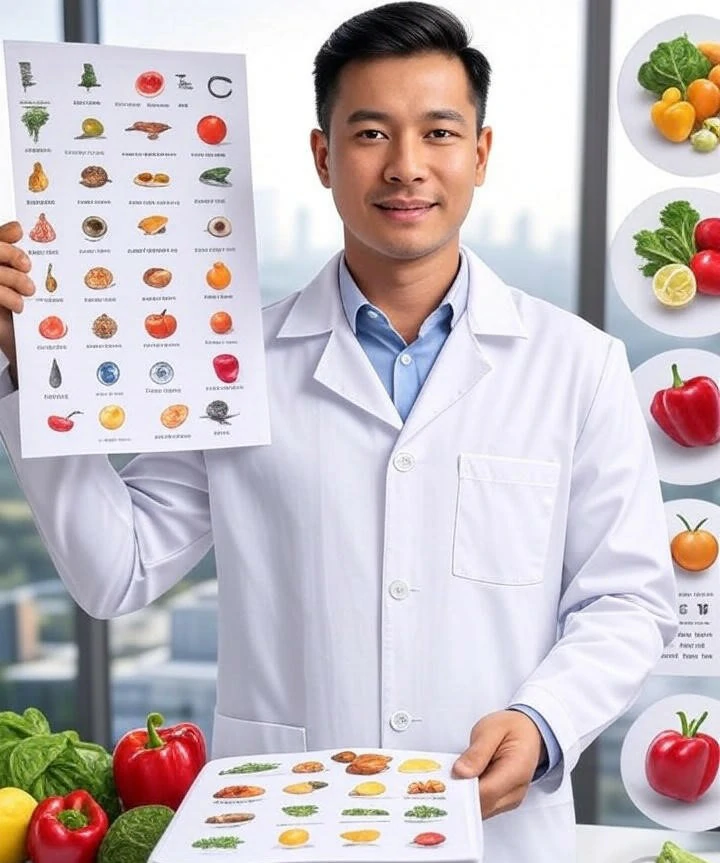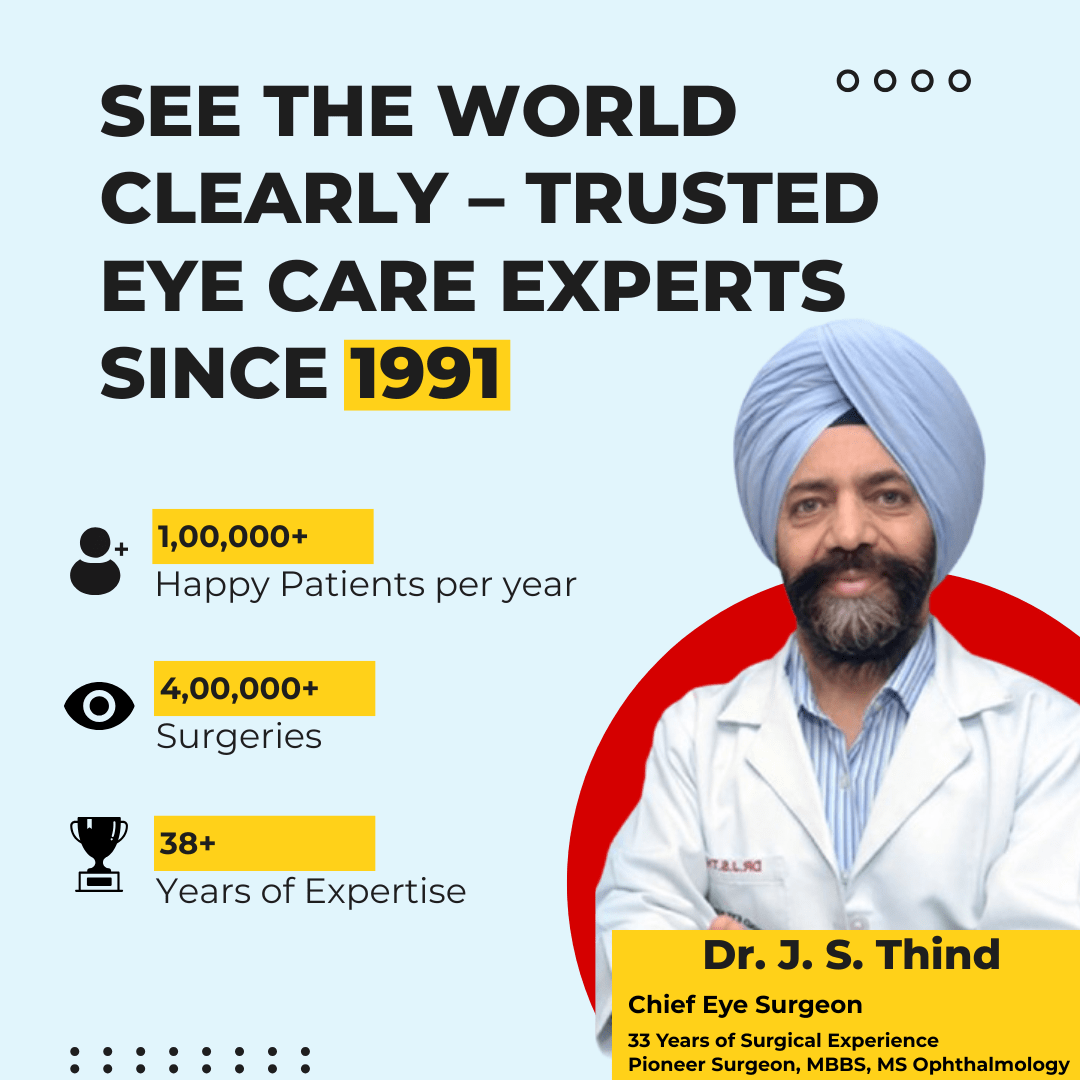Vision issues like cataracts, age-related macular degeneration (AMD), and dry eye syndrome are on the rise, but did you know that your daily diet can be a powerful defense? At Thind Eye Hospital, a leader in advanced vision care, we’ve treated thousands of patients and found that foods for eye health play a crucial role in maintaining and even improving vision over time.
This blog is designed to help you take real, effective steps to protect your eyes using trusted, nutrition-based strategies backed by both clinical experience and science.

Why Your Diet Is Key to Long-Term Eye Health
Your eyes require very specific nutrients vitamins A, C, E, omega-3 fatty acids, zinc, lutein, and zeaxanthin to stay healthy. A deficiency in any of these can raise your risk of conditions like:
- Cataracts
- Macular degeneration
- Dry eyes
- Diabetic retinopathy
- Diabetic retinopathy
Multiple peer-reviewed studies support this connection between diet and vision health:
Research Highlight:
“High dietary intake of lutein and zeaxanthin is associated with a reduced risk of advanced AMD.”
– Age-Related Eye Disease Study 2 (AREDS2), National Eye Institute
Source
Study on Greens and Vision:
“A diet high in green leafy vegetables significantly lowers the risk of cataracts and macular degeneration.”
– Journal of the American Medical Association (JAMA), 2005
Source
Top 8 Clinically Recommended Foods for Eye Health
1. Leafy Greens: Rich in lutein and zeaxanthin, two carotenoids that filter harmful blue light and reduce oxidative damage to the retina. Examples: Kale, spinach, collards, mustard greens.
2. Carrots and Sweet Potatoes: Packed with beta-carotene, a precursor to vitamin A, which helps prevent night blindness and keeps the cornea healthy.
3. Citrus Fruits: Loaded with vitamin C, essential for maintaining the health of eye blood vessels and slowing age-related vision loss. Examples: Oranges, lemons, limes, strawberries.
4. Fatty Fish: A rich source of omega-3s that help reduce inflammation, support the retina, and alleviate dry eye symptoms. Examples: Salmon, sardines, tuna.
5. Eggs: They contain a potent mix of lutein, zeaxanthin, vitamin E, and zinc, which together help reduce the risk of AMD.
6. Nuts and Seeds: High in vitamin E and plant-based omega-3s, these protect against free radical damage and maintain tear film stability. Examples: Almonds, flaxseeds, chia seeds, walnuts.
7. Legumes: A plant-based source of zinc, vital for transporting vitamin A to the retina, where it helps form melanin, a protective pigment. Examples: Lentils, black beans, chickpeas.
8. Bell Peppers: One of the richest natural sources of vitamin C and beta-carotene, which support collagen and eye tissue repair.
Conditions That Foods for Eye Health Can Help Prevent
| Condition | Nutrients That Help | Foods to Eat |
| Cataracts | Vitamin C, E, and lutein | Citrus fruits, almonds, leafy greens |
| Age-Related Macular Degeneration | Lutein, zeaxanthin, zinc | Eggs, spinach, legumes |
| Dry Eye Syndrome | Omega-3 fatty acids | Fatty fish, flaxseeds |
| Diabetic Retinopathy | Low-glycemic, antioxidant-rich foods | Berries, whole grains, leafy greens |
| Night Blindness | Vitamin A, zinc | Carrots, sweet potatoes, legumes |
Should You Use Eye Supplements?
While food should be your first source of nutrients, supplements can help certain individuals. Supplements are especially useful for:
- People over 50 with early signs of AMD
- Vegans/vegetarians lacking vitamin B12 or omega-3s
- Individuals with malabsorption issues
- Individuals with malabsorption issues
Tip: Always consult an ophthalmologist before starting supplements. The team at Thind Eye Hospital can guide you on whether you need AREDS2-based formulations, multivitamins, or targeted support.
Lifestyle Habits to Support a Diet Rich in Foods for Eye Health
Along with proper nutrition, your daily habits matter. Here’s what our experts recommend:
- Schedule annual eye exams
- Wear UV-protective sunglasses outdoors
- Use the 20-20-20 rule (Every 20 minutes, look at something 20 feet away for 20 seconds)
- Quit smoking
- Stay hydrated and limit processed foods
- Stay hydrated and limit processed foods
Why Choose Thind Eye Hospital?
With over two decades of excellence, Thind Eye Hospital combines medical innovation with personalized care. Our approach integrates:
- State-of-the-art diagnostics
- Retina and cornea specialists
- Nutritional counseling based on your condition
- Preventive vision care tailored to every age group
When you trust us, you’re not just getting treatment, you’re getting education, support, and long-term solutions.
Book Your Consultation Today
If you’re concerned about your vision, don’t wait for symptoms to worsen. A single consultation could reveal nutrient deficiencies or early signs of eye conditions and help you act before they progress.
Visit Thind Eye Hospital and speak with a retina or nutrition specialist about the best foods for eye health tailored to your lifestyle.
FAQs
It is recommended to undergo a comprehensive eye examination once every year, even if you have no symptoms. Regular check-ups help detect problems early, especially conditions like cataracts, glaucoma, diabetic eye disease, and refractive errors.
The right treatment depends on your age, eye condition, corneal health, lifestyle, and overall medical history. At Thind Eye Hospital, every patient receives a detailed diagnostic evaluation using advanced technology.
Choosing a NABH-accredited center like Thind Eye Hospital ensures you receive care that meets national and international quality standards. It guarantees safety, precision, trained experts, and ethical medical practices, giving patients greater confidence and better clinical outcomes.


